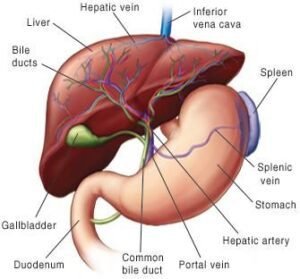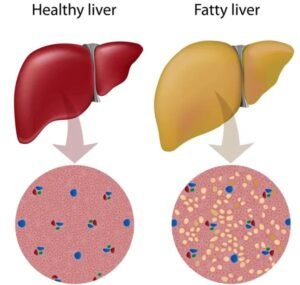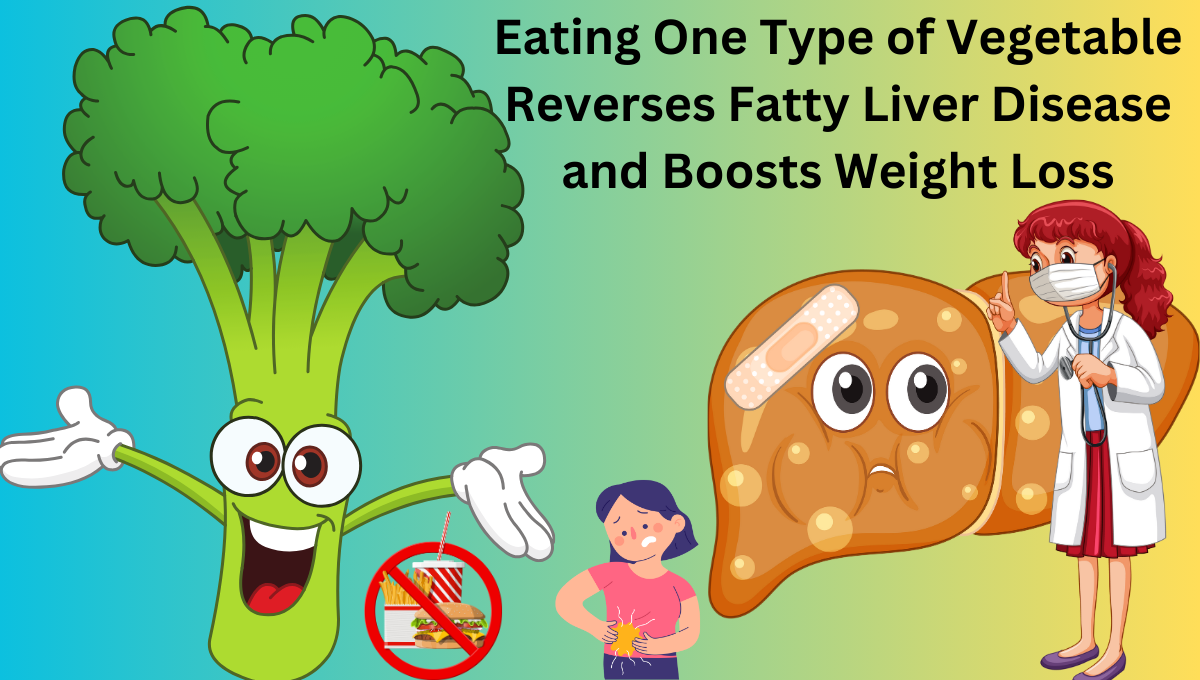Eating One Type of Vegetable Reverses Fatty Liver Disease and Boosts Weight Loss
Overview
Millions of individuals worldwide suffer from fatty liver disease, a condition that is becoming more and more of a health problem. It happens when too much fat builds up in the liver cells and affects how well they work. According to scientific study, adding specific nutrients to your diet can reverse fatty liver disease and aid in weight loss, even while lifestyle factors like poor diet and inactivity are major culprits. Broccoli is a powerful vegetable that is particularly notable for its capacity to promote weight loss and liver health.

Let’s examine the research underlying this superfood’s ability to improve your health.
Comprehending Fatty Liver Disease
Fatty Liver Disease: What Takes Place?
When triglycerides and other fats accumulate in the liver, fatty liver disease develops. There are two primary categories for this condition:
Alcoholic Fatty Liver Disease (AFLD): A condition brought on by consuming too much alcohol.
People who drink little to no alcohol may develop non-alcoholic fatty liver disease (NAFLD), which is frequently associated with obesity, high cholesterol, and type 2 diabetes.
Untreated fatty liver can develop into cirrhosis, fibrosis, or liver inflammation (steatohepatitis), which can result in liver failure.
Signs and Health Consequences
At first, many persons with fatty liver disease may not exhibit any symptoms. However, symptoms including exhaustion, pain in the abdomen, and edema may appear over time. Fatty liver that is left untreated raises the risk of:

heart condition.
resistance to insulin.
carcinoma of the liver.
Weight’s Effect on Liver Health
One of the main risk factors for fatty liver disease is obesity. Excess body fat exacerbates liver fat formation by causing insulin resistance and inflammation. For this reason, losing weight is essential to curing the illness.
The Vegetable That Can Reverse Fatty Liver
Presenting Broccoli, the Crucial Vegetable
When it comes to reversing fatty liver disease, broccoli is the most beneficial vegetable among the numerous that are proven to provide health benefits. Compounds in broccoli help fight oxidative stress and lessen the buildup of fat in the liver. Research indicates that eating broccoli on a daily basis can lower indicators of liver inflammation and raise liver enzyme levels.

Broccoli’s Nutritional Profile
Broccoli is rich in nutrients that are vital for the health of the liver, such as:
Sulforaphane: A potent detoxifier and antioxidant.
Fiber: Promotes weight loss and better digestion.
Vitamins C and K: Promote healthy liver function in general.
Phytochemicals: Encourage liver healing and fight inflammation.
Losing Weight with Broccoli
The Benefits of Broccoli for Weight Loss
Broccoli is a great food for weight loss because it is
Calorie-efficient: only 55 calories per cup.
High in Fiber: Prevents overeating by prolonging feelings of fullness.
High Water Content: Gives meals more volume without adding extra calories.
Additionally, fiber promotes intestinal health, which is important for preserving a healthy metabolism.
Using Broccoli to Increase Metabolism
Sulfur-containing substances found in broccoli, like glucosinolates, may improve metabolic functions and increase the body’s capacity to burn fat. Incorporating broccoli into meals can actively reduce liver fat and assist in avoiding weight gain.
How to Include Broccoli in Your Diet
The Greatest Ways to Eat Broccoli
Broccoli must be prepared correctly to optimize its health advantages. The most effective techniques consist of:
Its nutrients are preserved by steaming.
Stir-frying: Maintains health advantages while adding taste.
Raw: Ideal for snacking and salads.
Broccoli’s nutritious content may be diminished if it is overboiled.
How Much Broccoli Is Enough?
Try to eat 1-2 cups of broccoli per day for the best results. This quantity offers sufficient antioxidants and sulforaphane to promote liver health. For a well-rounded diet, combine broccoli with other liver-friendly foods like garlic and leafy greens.
Modifications to Lifestyle to Optimize Outcomes
Combining Exercise and Broccoli
Consuming broccoli by itself isn’t a panacea. A balanced diet and regular exercise can help reverse fatty liver and reduce weight. Exercises that improve fat metabolism and liver health include strength training, swimming, and brisk walking.
Additional Foods That Promote Healthy Liver Function
There are other foods that are good for your liver besides broccoli. To enhance your diet, include:
Leafy Greens: Kale and spinach.
Berries: For antioxidants, try blueberries and cranberries.
Green tea: Packed with catechins that help cleanse the liver.
In conclusion
When it comes to weight loss and liver health, broccoli is a real superfood. Its special blend of antioxidants and nutrients promotes metabolism, enhances liver function, and lowers liver fat. Broccoli can be quite helpful in correcting fatty liver disease and enhancing general wellness when combined with regular exercise and a healthy diet.
FAQs
Can fatty liver be reversed by broccoli alone?
No, broccoli is most effective when consumed in conjunction with a healthy diet and regular exercise.
Which methods of cooking broccoli have the greatest health benefits?
The greatest nutrients are preserved when steaming or stir-frying.
Does consuming excessive amounts of broccoli have any negative effects?
Because of its fiber content, overconsumption may result in gas or bloating.
What is the duration required to observe results?
Improvements can be seen after a few months of consistent dietary adjustments.
Which other veggies are beneficial to the health of the liver?
Brussels sprouts, artichokes, and leafy greens are great choices.


1 thought on “Eating One Type of Vegetable Reverses Fatty Liver Disease and Boosts Weight Loss”